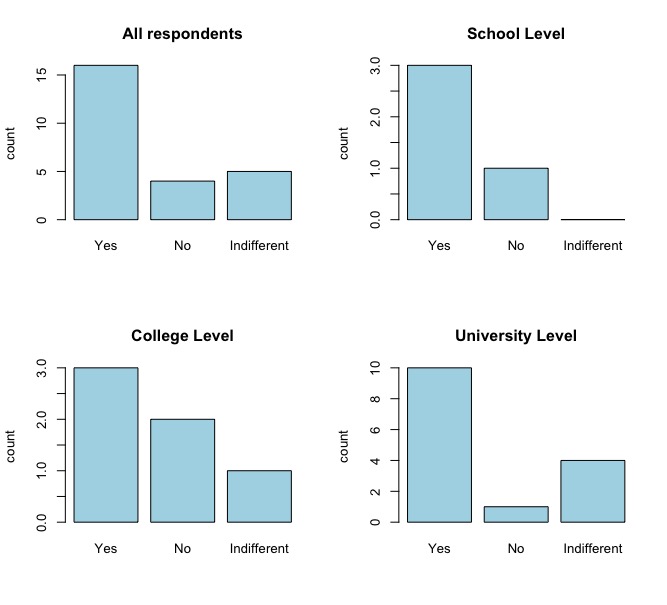Thanks to all of you who responded to the recent post double your bonus where I posed the following question:
You are presented with two envelopes. One contains exactly double the amount of money contained in the other. You open one of the envelopes and observe that it contains £1000. You can keep this as your bonus, or swap it for the other (unopened) envelope, whose contents will then be your final bonus, without the option of swapping back. What will you do?
We’ll look at your answers below, but first let’s discuss the problem itself.
Let’s first assume that you haven’t a clue what level of bonus you are expecting, so you have no idea whether £1000 is on the high or the low side.
Here’s one argument: I opened one envelope and found £1000, so I know the other envelope must contain £500 or £2000. The average of these alternatives is £1250, which is greater than the £1000 I could safely keep. So, my expected winnings are greater if I swap, and it’s in my interests to do so. In other words: sometimes I’ll do better by swapping, and sometimes I’ll do worse, but on average I’ll be £250 better off, so I should swap.
But there’s an alternative, equally compelling argument. Both envelopes were identical. I chose one at random. By symmetry there has to be a 50/50 chance that this is the best choice. Knowing the envelope contains £1000 doesn’t change this fact because I had no idea what my bonus might have been. So, there can’t possibly be any advantage or disadvantage in swapping, and I can either swap or not without any gain or cost (on average).
It’s difficult to see a flaw in either of these arguments, but they can’t both be right. Actually, the first argument is wrong, though it’s not easy to see why. A fairly detailed explanation of the flaw in the logic is given in Wikipedia, though in the version of the problem stated there, the first envelope is unopened, and you have to choose whether to swap it without knowing its contents. However, if you have no idea whether £1000 is a good or a bad bonus, then opening the envelope and seeing £1000 gives you no extra information, and you might as well have not opened it, in which case the Wikipedia discussion is equally relevant.
The correct version of this argument is to fix the amount of money in the two envelopes as M and 2M say. If you happen to pick the envelope that contains M you will gain M by swapping. If you pick the envelope that contains 2M you will lose M by swapping. So on average, since both cases were equally likely, you gain 0 by swapping.
That’s the textbook answer: there’s no gain to be had in swapping and you can therefore be indifferent about whether to swap or not.
However… things change if you have some idea of what your bonus is likely to be. If you were expecting a fairly small bonus and £1000 exceeds your expectations, then this provides additional information that your envelope is likely to be the one containing 2M rather than M. In that case you’d be advised to stick with the £1000. But if you were expecting a high bonus, the opposite is true: your prior beliefs imply that your envelope is more likely to be the one containing M than 2M and you’d be advised to swap.
So, congratulations: whatever answer you sent me, you were right!
*Though not necessarily for the right reasons*
Thank you again to those of you that responded to the original post: your answers are summarised in the following set of bar plots.

The plot in the top left corner shows most of you who replied thought it best to swap: presumably because you’d made the calculation that £1000 was lower than the bonus you were expecting. 😁
The other three plots break the results down according to how you answered the second question about level of statistical training. What I thought might happen here is that people with the least statistical training might favour being indifferent about swapping – which, in the case where you have no idea what your bonus should be – is the most sensible answer. Whereas I thought individuals with more statistical training might be more likely to fall into the trap of the argument which suggests you should swap. The plots above don’t really support that hypothesis, but with a total of 25 replies spread over 3 categories, it would be remarkable if that pattern showed up anyway.
I’d also intended to break the answers down by the third question relating to position in the company, but I only got one reply from employees at management level and two from clients or other non-employees. I’d hoped there might be enough data to show that managers, who were expecting a high bonus, would be more likely to swap, whereas non-management employees, for whom £1000 might seem a reasonably significant sum, were more likely to stick. But it’s impossible to tell if that was the case from the few data I received.
So, in summary, there’s not really enough information to conclude anything other than the fact that there was a strong preference overall to accept the swap.
Finally, some of you were also kind enough to write to me to explain your decisions. I really appreciate that effort. Of these responses my favourite was from Paul, who wrote:
I’m going with a) the definite swap…..gambling all day long 😃
